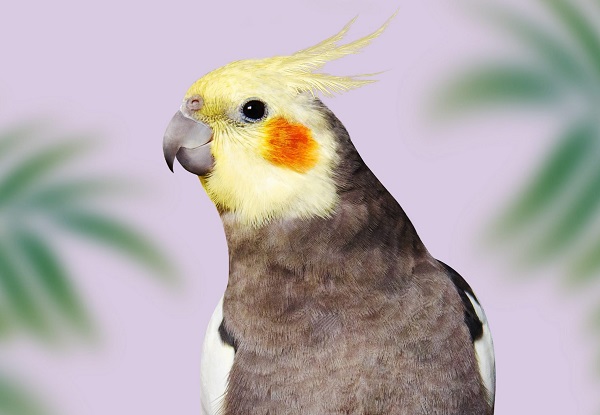
The cockatiel’s native country is Australia, and their native habitat is mainly in the grassy, sub-tropical regions of their home country. Because of the highly fluctuating temperatures, cockatiels are quite hardy and can live in outdoor aviaries in much of North America and Europe.
In addition to the normal gray color found on wild cockatiels, there are many colors which have been formed over time by selective breeding. The white-faced cockatiel is, as its name suggests, gray with a white face. The lutino is all yellow, except for the orange ear patches present on the wild-type, or gray, cockatiel. The cinnamon is a pale brownish color. Other colors include the pearl, blue, and red-eyed silver.
Some types of cockatiels, as well as having distinctive coloring, also have other physical characteristics unique to their coloration. One of these is the bald spot, found on the back of the bird’s head under and behind its crest. This feature occurs most often on the birds of Lutino coloration. This is considered by some experts to be a fault, although it doesn’t do the bird any harm.
Proper Diet
Although seed mixes are essential to a cockatiels diet, fruits and vegetables are good for more than the occasional snack; a cockatiel needs plenty of these foods for a healthy diet. Some birds prefer different foods than others; most cockatiels especially enjoy lettuce, broccoli, and apple slices. Give him small samples of foods like apple or banana slices, broccoli, or carrots to find out what he likes best. Citrus fruits are not good for cockatiels. Non-sugared cereal and millet seeds are fine, and cockatiels love them, but they should probably be considered something of a treat as they can be quite fattening. Cuttlebone is a white, chalky substance, which cockatiels can chew on to keep their beaks healthy. Cuttlebone also contains nutrients and chewing on it helps keep cockatiels from getting bored.
The family room is the best place in a typical house to put a cockatiel’s cage. Cockatiels love being the center of attention, and they get lonely and bored if they’re left on their own. Cockatiels are very adept at hiding illnesses until it’s too late to treat them. To be safe, if you see anything that may be an indication of an illness, you should take them to the veterinarian immediately. Even if you don’t notice any sign of sickness, it’s good to get your bird to a veterinarian for a “checkup” at least once every six months.
If your cockatiel somehow escapes to the outdoors, what can you do to get him back inside safely? Hosing the escapee with water wets down his feathers so he can’t fly. A cage with food and water, or one with another cockatiel, can help lure a bird back towards home. It’s better, though, to simply make sure all potential escape routes are closed off before you bring a cockatiel out of his cage.
Periodically rearranging toys and perches in their cage, and furniture or items in the room where they live, is a good idea. While many cockatiels may seem a bit nervous right after you reconfigure their “furniture”, they will soon get used to the change and do just fine. It’s a good idea to do this occasionally, so they don’t get bored. However, don’t change things around constantly, as this will make them nervous and stressed.
Handling your bird every day will give you a good idea of what is normal for your pet in terms of weight and body condition. Because sick birds can become quite thin in a short amount of time, handling your bird often can help you keep a close eye on your pet’s health and help to alert you to any health problems early on. Handling also helps to keep pet birds tame. Although dogs and cats have been bred for pets for hundreds of years, birds have not. Because of this, they are not domesticated and must be tamed on an individual basis. Handling your bird every day will help build the bond between you and your pet, and will deter wild and destructive behavior. Handling is soothing to both birds and owners.
Being loved and petted is great for a pet bird’s mental and emotional health, and research has proven that petting animals can lower stress levels in their human owners. With all these great reasons to invite your bird out to play, you shouldn’t have any trouble setting aside an hour or two each day to handle and socialize with your pet. Your bird will benefit from all your love and attention, and in return you will have a happy, healthy, and well-adjusted pet.
Provide by Creatures Corner reader Alyson Burgess
Related Articles & Free Email Newsletter Sign Up
3 Reasons to Handle Your Pet Bird Every Day
How to Properly Clean a Bird Cage

Comment here